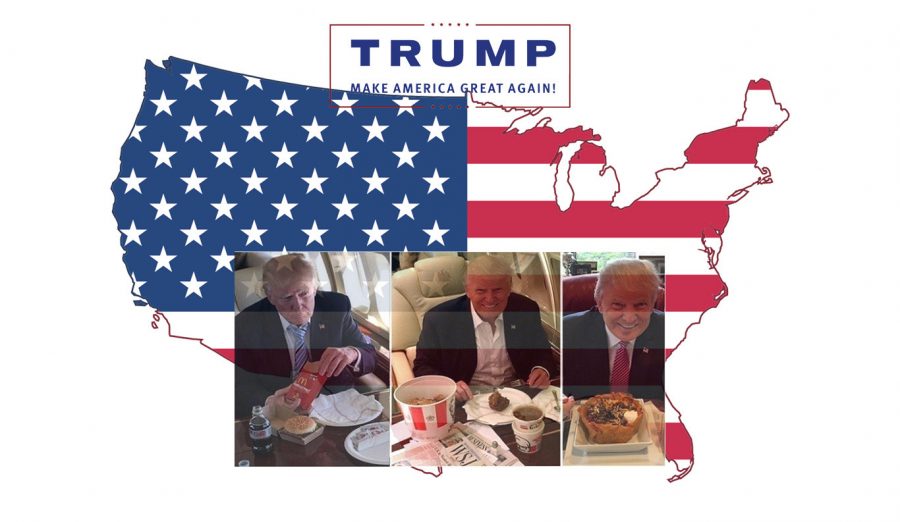On Monday, I accepted the assignment to write an opinion piece. There are lots of things to feel opinionated about these days, especially in politics, so it seemed like it would be an easy thing to do.
As I reflected on ideas and topics, time and time again, I kept circling back to writing about how Trump is so obviously unfit for for the presidency, but then I started to wonder, “What’s the point?”
Is there any point to writing another outraged analysis of the president only to be read by other people who are already equally outraged? I am exhausted from being outraged.
Despite the wildly inappropriate things Trumps does and says, at this point, it seems most people have made their minds up on Trump’s presidency. If you’re still not bothered by his conduct, then there’s probably nothing he can do to cause you to question his fitness for office.
Trump himself seems to marvel at the unwavering support of his base. In January 2016, at an Iowa campaign rally, he said, “I could stand in the middle of 5th Avenue and shoot somebody and I wouldn’t lose voters.” He may have been right.
We seem to exist in separate realities. How is it we can see and hear the same things but come to such different conclusions? It is maddening.
The irrational disconnect from reality only fuels the overwhelming sense of frustration, anxiety and dread. How is this all possible?
So there I was, sitting at home, trying to find an approach to write an opinion that added some new insight to the debate. On the TV, Jerry Seinfeld’s “Comedians in Cars Getting Coffee” streamed on Netflix.
Seinfeld’s guest was Christoph Waltz, from Vienna, Austria. He is known in this country for his Oscar winning roles in Quentin Tarantino’s “Inglourious Basterds” and “Django Unchained.” A running joke of the episode is how sophisticated and refined Waltz sensibilities are.
Seinfeld took Waltz to an IHOP in Torrance. The joke being that despite its name, IHOP is neither sophisticated nor international. It’s a diner.
“No wonder that healthcare is so expensive,” Waltz said while looking at a picture of a plate overflowing with pancakes slathered in butter, surrounded by sausage links on one side bacon strips, and eggs on the others. Across the top of the photo of the massive serving of high calorie food, fuchsia letters spelled, “Sprinkled with Joy.”
The two men trade laughs, riffing on the over the top excess of the “Festive Flavors” menu.
“We have to fix all of that after you eat it. Don’t worry about the consequences. You eat what you want. We’ll fix it. That’s the American way of life,” Seinfeld quips.
That’s when it hit me. This is the core message of Trump. It’s good to ignore reality and consequences. There’s no need work on anything or be burdened by facts and scientific evidence, and don’t; don’t change; you can do what you want. It’s not your fault. Blame someone else.
Don’t learn about things. Don’t read when you can watch TV. Knowledge is overrated. Expertise is for sissies. It’s better to go with your gut. Make stuff up. Embrace and celebrate ignorance. State the obvious in self satisfied way. Waste energy. Waste resources. You won’t live forever. Better use it up while you can.
If you don’t like people because they’re different from you, that’s great. Let your prejudice flag fly.
“The wall” is a stupid idea, but if Trump believes the wall is important, then he should have made the case that it was worth paying for all along. Things worth having are worth paying for. They are worth sacrificing for. Americans should not expect other countries to solve their issues. Suggesting Mexico should pay for a border wall for the U.S.–the richest country on earth–is a morally reprehensible position.
I understand getting things for free is cool. I’m happy to get stuff for free even if it’s not something I really want. I also understand it can be difficult to change behavior and thinking. It can be easier to point the finger at others, and live in denial than it is to solve problems.
Dealing with real issues, like the cost of healthcare, the effects of climate change or repairing America’s “crumbling infrastructure” requires sacrifice. Sacrifice can be hard.
Of course conservatives and liberals have differing ideas about how to solve problems, but the willingness to make sacrifices has long been an American value, not a partisan one. From military and humanitarian aid around to globe, to JFK’s “ask not” and Reagan’s “pull yourself up by your own bootstraps,” a big reason why the United States has been a great country is the willingness of Americans to sacrifice for others and solve problems for themselves.
To Trump, the world is one big all-you-can-eat buffet where people can eat all the shitty food they want without consequences. Nobody gets sick, and someone else always picks up the tab.
How is Trump’s message of selfishness working out so far? Is our country more united? Do Americans seem happier? Is our standing in the world on the rise? No. People are divided. People are pissed. Our reputation is stained.
Selfishness did not make America great, and it will not “Make America Great Again.”



